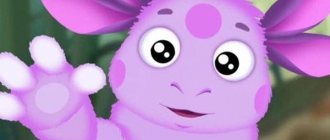Psychological games for children from 3 years old
By the age of three, most children already know how to talk, so you can play psychological games that are also aimed at developing communication skills. It must be taken into account that three-year-olds are quite active, so games should be active, with elements of imitation.
"Show your feelings"
Ask your child to pretend to be angry, hurt, happy, surprised
and so on.
You can do this however you like: with facial expressions, hands, feet, voice. If the child doesn’t succeed, help him and try to do it together (“How are we going to get angry? Let’s scream and stomp our feet” / “Let’s be happy, smile and jump high, high”).
Purpose of the game:
teach the baby to express his emotions, to express himself.
"Magic wand"
This game is best played with several children. Tell the kids that you have a magic wand that can turn them into anyone (mom, dad, toy, animal). They should try to try on a certain role.
An adult should play along with the children and observe how they will behave in one role or another, what to say. If the baby pretends to be a mother, then an adult can try on the role of a child and begin to be capricious. It will be interesting to watch the reactions of the participants. Some will feel sorry for the baby, others will scold him. In the same way, when pretending to be a cat, one child may begin to caress and the other to hiss. All this is very indicative and reflects relationships in the family, the children’s anxieties, and their mood at the moment.
Purpose of the game:
teach you to try on different roles and express yourself.
"Good deed"
Invite your little one to do something nice for a friend or loved one (dad, aunt, grandma) to make him smile. You can simply stroke, kiss, say something good, treat him with cookies, or you can give him some pleasant surprise in the form of a craft or a postcard.
Purpose of the game:
teach a child to be kind to others, motivate him to do good deeds just like that.
"Help me"
Make an obstacle course
, consisting of puddles, bumps (massage mat, pillows, sheets of cardboard, etc.).
Tell your child that you are afraid and ask him to help overcome obstacles. Let him give you his hand and lead you to certain places. Say: “It’s so good that you are with me!
With you I’m not scared at all.” In the same way, you offer him help while passing obstacles.
Purpose of the game:
to build trust, confidence in the adult-child relationship, confidence in one’s importance and one’s strengths.
“What is good and what is bad”
Stage various situations where one of the characters acts badly (the situations should be simple and unambiguous).
The baby’s task is to say who did something bad and why.
, and then together analyze the situation and play it again, but this time as it should be.
For example, the Katya doll wanted to take a toy from the Tanya doll, but when she was refused, she hit her.
We say: “Ah-ah-ah, Katya doll. Fighting is not good. You need to apologize and ask politely. Say: “Give me, please.”
Then you can play several options:
- The doll asks politely, receives the toy, and says “thank you.”
- Doll Tanya doesn't want to share. In this case, we say: “The doll does not want to give her toy. She still wants to play with it. Let's give the Tanya doll another toy. Let him play with her. “Here, doll Tanya - don’t be upset.”
Purpose of the game:
Psychological games for children two to three years old are very useful and important! Each of them not only performs a developmental function, but also allows the child to learn the art of communication, to feel exceptional and needed, to gain confidence in himself and his adult, who is always nearby.
Crisis of three years
Poor behavior at the age of three is not always an indicator of a bad temperament or mood swings. In order to properly raise a child, parents must first figure out why he behaves this way. It is worth noting that at this age, boys and girls tend to be capricious and throw tantrums in the same way.
First you need to understand such a psychological term as frustration. This is a state of an adult or child when desires and needs cannot be fully satisfied. The baby grows up when he begins to realize that not all his desires are fulfilled. A sensitive, understanding parent will be able to immediately understand when a child’s hysteria is due to the fact that his “wants” are not being fulfilled. But a baby can be capricious for other reasons: physical illness, quarrels in kindergarten, misunderstanding on the part of the teacher, etc.
Interesting: How to help a child learn to do homework - without scandals and disputes





